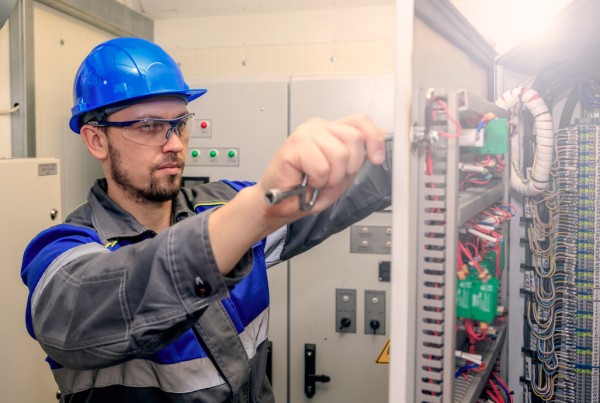Emerging Trends in Electrical Contracting: What to Expect in the Next 5 Years
Introduction
The electrical contracting industry is at a pivotal point, with rapid advancements in technology and increasing emphasis on sustainability driving significant changes. Over the next five years, several emerging trends are set to reshape the landscape of electrical contracting. This article delves into these trends, providing insights into what electrical contractors can expect and how they can prepare to thrive in this evolving environment.
1. Integration of Smart Technologies
Smart technology integration is no longer a futuristic concept but a present reality, rapidly gaining traction in the electrical contracting industry. Smart systems, including smart lighting, thermostats, and security systems, are becoming standard in residential, commercial, and industrial settings. Electrical contractors need to be well-versed in these technologies to meet the growing demand for smart homes and buildings.
- Training and Certification: Contractors should invest in training and certifications for smart home technologies, ensuring they are equipped to handle installations and troubleshooting.
- Partnerships with Tech Companies: Forming partnerships with technology providers can provide contractors with the latest tools and updates, ensuring seamless integration and enhanced customer satisfaction.
2. Increased Focus on Sustainability
Sustainability is a major driver of change in the electrical contracting industry. With growing awareness of environmental issues and stricter regulations, there is a heightened focus on energy efficiency and the use of renewable energy sources.
- Energy-Efficient Solutions: Contractors should stay updated with the latest energy-efficient technologies, such as LED lighting, energy-efficient HVAC systems, and advanced insulation materials.
- Renewable Energy Installations: Solar panels, wind turbines, and other renewable energy solutions are becoming more common. Electrical contractors must gain expertise in installing and maintaining these systems to stay competitive.
3. Advanced Building Automation Systems
Building automation systems (BAS) are transforming how buildings operate, offering enhanced control over various building systems such as HVAC, lighting, and security. These systems not only improve energy efficiency but also enhance occupant comfort and safety.
- Knowledge of BAS: Contractors should deepen their knowledge of BAS technologies and their integration with traditional electrical systems.
- Data Analytics: Understanding data analytics is crucial, as BAS systems generate vast amounts of data that can be used to optimize building performance and reduce operational costs.
4. Adoption of Augmented Reality (AR) and Virtual Reality (VR)
AR and VR technologies are making their way into the electrical contracting industry, providing innovative solutions for training, design, and troubleshooting.
- Training and Simulation: VR can be used for immersive training experiences, allowing electricians to practice complex installations and repairs in a safe, controlled environment.
- Enhanced Design and Planning: AR can help in visualizing electrical layouts and installations, reducing errors and improving efficiency.
5. Emphasis on Cybersecurity
As electrical systems become more interconnected and reliant on digital technologies, cybersecurity becomes a critical concern. Electrical contractors must ensure that the systems they install are secure and protected from cyber threats.
- Cybersecurity Training: Contractors should undergo cybersecurity training to understand the potential risks and how to mitigate them.
- Secure Installations: Ensuring that all smart devices and building automation systems are installed with robust security measures is essential to protect against cyber-attacks.
6. Development of Electric Vehicle (EV) Infrastructure
The rise of electric vehicles is driving the need for extensive EV charging infrastructure. Electrical contractors will play a vital role in this development, from residential charging stations to public charging networks.
- EV Charger Installations: Gaining expertise in the installation and maintenance of EV charging stations is crucial as the demand for these services increases.
- Partnerships with Automakers: Forming partnerships with EV manufacturers can open up new business opportunities and provide contractors with the latest technologies and standards.
7. Growth of Prefabrication and Modular Construction
Prefabrication and modular construction are gaining popularity due to their efficiency and cost-effectiveness. These methods involve assembling components off-site and then transporting them to the construction site for installation.
- Prefabrication Techniques: Contractors should familiarize themselves with prefabrication techniques and the specific requirements for electrical installations in modular buildings.
- Collaboration with Manufacturers: Working closely with manufacturers can ensure that prefabricated components meet all necessary electrical standards and specifications.
8. Evolution of Building Information Modeling (BIM)
Building Information Modeling (BIM) is revolutionizing the construction industry, providing detailed digital representations of physical and functional characteristics of buildings.
- BIM Proficiency: Electrical contractors need to become proficient in using BIM tools to enhance collaboration and improve the accuracy of electrical designs.
- Integration with Other Trades: BIM facilitates better integration with other trades, reducing conflicts and ensuring seamless installations.
9. Implementation of Drone Technology
Drones are becoming valuable tools in the electrical contracting industry, offering benefits such as improved safety and efficiency.
- Inspections and Surveys: Drones can be used for aerial inspections and surveys, providing detailed images and data that can help identify potential issues without the need for scaffolding or ladders.
- Training and Licensing: Contractors should invest in training and obtaining the necessary licenses to operate drones legally and safely.
10. Rise of IoT (Internet of Things) in Electrical Systems
The Internet of Things (IoT) is connecting devices and systems like never before, offering new opportunities for electrical contractors.
- IoT Device Integration: Contractors should understand how to integrate IoT devices into existing electrical systems, ensuring seamless communication and functionality.
- Data Utilization: The data generated by IoT devices can provide valuable insights for optimizing system performance and predicting maintenance needs.
Conclusion The next five years promise significant advancements and changes in the electrical contracting industry. By staying abreast of these emerging trends and investing in the necessary training and technologies, electrical contractors can position themselves for success in this dynamic environment. Embracing innovation and sustainability will not only enhance their service offerings but also contribute to a more efficient and environmentally friendly future.




